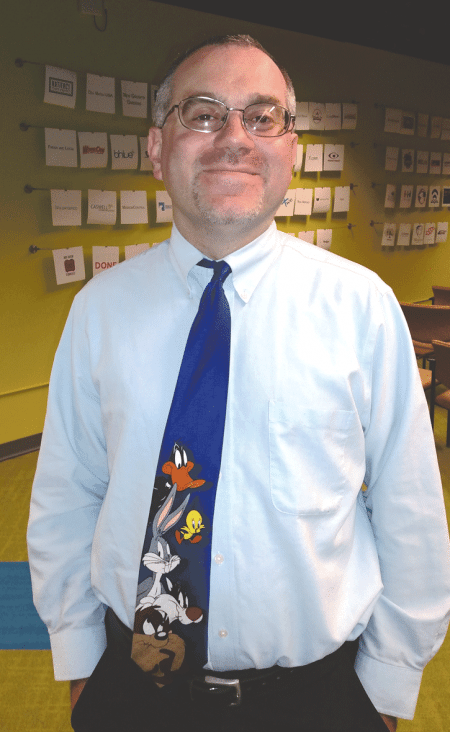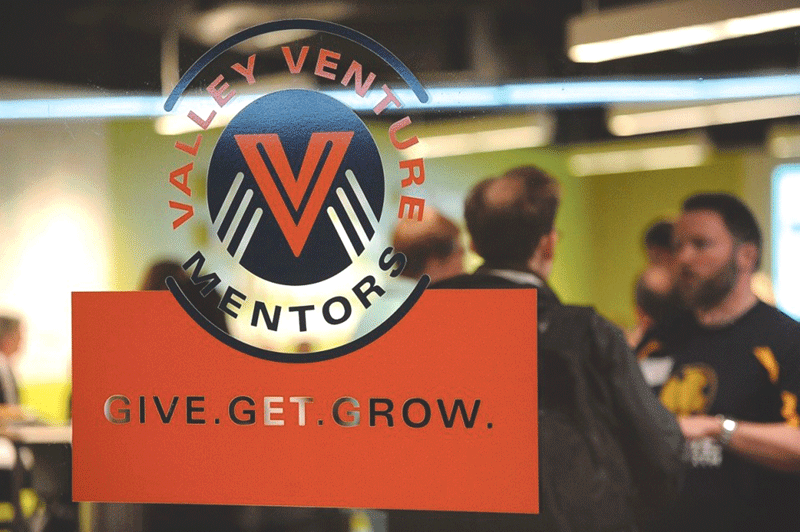
VVM Set to Launch Collegiate Accelerator This Summer
Real-world Education

Valley Venture Mentors co-founder Paul Silva
Valley Venture Mentors has long cultivated entrepreneurship in the Pioneer Valley through programs like its signature Accelerator, which provides education and support for aspiring business owners to hone their ideas. VVM’s Collegiate Accelerator, set to begin in June, is a different beast, focusing on a younger group with startup ideas and tossing them into a more demanding, time-intensive experience than the traditional Accelerator. But they do have something in common with their older peers: they don’t know anything. Yet.
Paul Silva recalls how Valley Venture Mentors was born out of entrepreneurship classes he and his fellow co-founders, Scott Foster and Jay Leonard, were teaching at UMass. But the vast majority of participants in VVM’s programs have been past their college years.
“But the student demand was there all along,” Silva said. “College students needed this.”
Which is why the Springfield-based nonprofit — which aims to build, support, and maintain an entrepreneurial renaissance in Western Mass. — launched a Collegiate Accelerator program this summer for college students and recent graduates. Twenty startups have been chosen to participate in the eight-week program, which was funded by multiple sources, including an anonymous donor who made a significant contribution.
“The donors agreed with us: ‘hey, we have great kids in our schools, or great kids are born here and go somewhere else to school. What they need is a great reason to stay,’” Silva told BusinessWest. “We want to show them that, if they want to create a startup, this is the place you can do it, and there’s no better time in their lives.”
There are some important differences between VVM’s traditional Accelerator and the collegiate version. While the adults in the former program dedicate one long weekend a month, the college students are essentially working a 40-hour schedule for eight weeks, with 20 hours per week spent in the classroom and another 20 in the field, meeting potential customers and honing their idea into a workable business plan. The accelerator will run weekdays from mid-June through August, and participants will receive a $2,000 stipend.
“We can run the program over the summer and not conflict with their studies,” Silva said. “Local kids can participate over the summer, and kids who come here for school can stay here over the summer. So we’re keeping all these great kids here; we give them our intensive program, and we get those great minds to stay local.”
We’re giving them an internship at their own startup, and they’re getting paid. We’re taking eight weeks of their summer, leaving time at the beginning and end, and we make it intense.”
Silva noted that participants will learn how to pitch their startup and how to raise capital, and will benefit from successful entrepreneurs and business leaders who will serve as speakers and mentors.
It is in some ways the best job of their lives so far, he added. “We’re giving them an internship at their own startup, and they’re getting paid. We’re taking eight weeks of their summer, leaving time at the beginning and end, and we make it intense. It’s a full-time job.”
VVM worked with a variety of partners, from the Grinspoon Charitable Foundation to area colleges, to publicize the Collegiate Accelerator and attract applications. Being chosen for one of the 20 slots was a two-part process. In the first, the applicants judged each other’s ideas blindly — no name, age, gender, or race information was attached. From that peer review, a number of startups were chosen to attend a screening party where they made their elevator pitch before at least 10 different VVM members, who grilled them about their ideas.
It’s an intense process, Silva said, but superior to coming before, say, a three-member panel and needing unanimous approval. With that model, if someone has an idea involving video games and one of three judges simply hates video games, it’s over. With 10 or more judges, there’s more leeway for those biases to be filtered out. And applicants who were not chosen were given plenty of practical feedback that might make them more likely to be chosen next summer.
Knowing Nothing
For those taking the plunge this June, the first lesson is a mantra that has been used often at Valley Venture Mentors.
“The foundation of our program is, you don’t know anything, and neither does your business partner,” Silva said. “All you have is a good idea.”
That idea requires testing through actual field work, he said. “Maybe I want to make video games for blind people. And it turns out that blind people are mostly older and don’t give a darn about video games, but they do miss socializing. So now I’ve learned more about them, and about social isolation.”
Perhaps that leads to a different idea for a video-game company, or a completely different type of company focusing on the needs of blind people. Those crossroads pop up all the time for young entrepreneurs, he explained. In fact, Silva said most entrepreneurs at the idea stage are 90% wrong, and the idea is to discover where they’re 10% right, and build on that.

VVM’s overarching goal is to catalyze the entrepreneurial renaissance in the Pioneer Valley.
A few of the 20 participants in the Collegiate Accelerator have actually received money in exchange for products, but most have not gotten that far, nor should that be expected at this stage of the game, Silva said.
“I tell them a startup is not a job where you make money; it’s where you figure out how to make money. A business is a job where you make money. The goal is to grow your startup into a business. If people are already giving you money, that’s a great signal, but it’s not the goal.”
The students participating in the 2017 Collegiate Accelerator include:
• Boman Container Homes, Springfield Technical Community College (STCC): offers a variety of customizable container homes, offices, and cabins for sale, ranging from economic to luxurious;
• Bystand, Hampshire College: connects certified bystanders, who rarely use their skills, with people nearby who are in need of immediate medical assistance;
• CognitEyes, UMass Amherst: makes affordable, comfortable, eye-tracking glasses, helping identify diseases, assess fatigue, and understand consumer behavior;
• DetraPel, Babson College: a super-hydrophobic liquid repellent that repels any liquid from almost any surface;
• El Cherufe Chile Paste, Greenfield Community College: offers a unique hot flavor profile to lovers of all things spicy in a versatile paste form;
• In Case Audio, UMass Amherst: installs speaker systems into vintage suitcases to create a stylish yet portable speaker and amp;
• Love Jones Renaissance Café & Lounge, STCC: a cozy, sophisticated lounge and café that provides customers with an ambiance that fosters individual and group creativity and networking;
• Lymph + Honey, Hampshire College: provides access to healthful, wholesome, and sustainable natural hair- and body-care products;
• Mitho MoMo, Mount Holyoke College: brings authentic Nepalese foods back to their people in the U.S. at affordable prices with the convenience of a microwave;
• Peace of Mind Home Inventory, STCC: personal asset inventory for insurance and estate planning;
• Redflowers, Smith College: promotes, empowers, and engages black identities and black women;
• Salad Express, Elms College: an inexpensive healthy fast-food experience;
• Shesabelle Chandeliears, Smith College: adds versatility and variety to modern jewelry owners’ earring selection;
• Socialopolis, UMass Amherst: a virtual and augmented reality software and hardware development firm;
• STEAMporio, STCC: STEAM education marketplace with a focus on the maker and DIY communities;
• Studio 26, Holyoke Community College: an inspiring network that strengthens the community and encourages growth and self-expression through the arts;
• The Schwa Company, Smith College: provides on-demand, real-life translators through an app 24/7, eliminating language barriers;
• The Travel Unicorn, Mount Holyoke College: an LGBTQ+ travel guide dedicated to sharing stories of love and travel, connecting LGBTQ+ travelers to safe and fun travel destinations;
• Vidvision, Babson College: offers a suite of interactive lead-generation tools to help SMBs drive ROI on their video content; and
• Zirui Collective, Mount Holyoke College: a beauty tech company that builds a compact, modular, customizable makeup kit that is space-efficient and travel-friendly.
Catalyzing the Valley
When asked what the end goal of the Collegiate Accelerator should be, Silva said it’s similar to VVM’s overarching goal of catalyzing the entrepreneurial renaissance in the Valley.
“One of the most underutilized assets in the Valley is our college students,” he said. “We know from personal experience, and from the experience of others around the country, that if you shower young entrepreneurs with love and support, they’ll be more likely to find success, to remember you, and to stay here. Not everyone is going to stay, of course, and not everyone should stay; if what you’re doing is perfect for Silicon Valley, then you should go to Silicon Valley. But this is a great region for all kinds of startups.”
Besides, he added, startups that leave the area often become ambassadors of sorts, or allies, of the Pioneer Valley. One team from London that took part in a VVM Accelerator has since helped three other teams expand their business in the United Kingdom.
“We are dedicated to helping entrepreneurs launch and thrive. Students are one of the most high-potential populations our region has, and with a bit more help, they could really have an impact here,” Silva said. “We can’t wait to learn about their ventures and help them take the next steps to launch.”
Joseph Bednar can be reached at [email protected]




